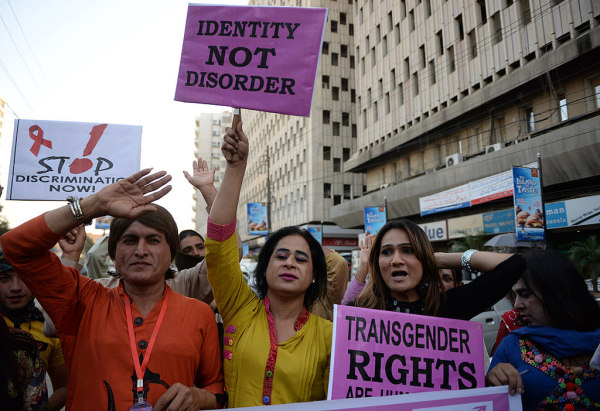
Transgender people in Pakistan carry placards as they rally to mark World Aids Day in Karachi on November 30, 2013. Asif Hassan / AFP/Getty Images
Pakistan's Trans Community Receives Help From Unlikeliest of Allies
Life as a transgender person in Pakistan is difficult to say the least, but it may get a little easier with the help of a group of Islamic clerics.
Transgender persons in Pakistan have never enjoyed equal rights to other citizens in a society where discussion of gender or sexuality is not only taboo but in some cases illegal. They often act as the entertainment at weddings, singing and dancing to make money, but they cannot themselves get married due to Pakistani law.
It was only in 2012 that Pakistan's Supreme Court ruled in favor of transgender people receiving identity cards, allowing them the right to vote after 65 years of disenfranchisement, but while this legal ruling was handed down, it has not been enforced completely.
Despite the legal ruling, many are still not issued with a national identity card, without which they are cut off from daily tasks such as buying airline tickets or opening bank accounts. Some are forced to roam the streets as beggars by day and by night as prostitutes to survive.
A debate on the status of transgender people in Pakistan has been building since May, following the controversial death of a transgender patient in Peshawar who was not treated by doctors after being shot multiple times.
But an important change in status, one that does come with limiting conditions, has been affirmed by the unlikeliest of allies.
Fifty clerics from the Tanzeem-Ittehad-i-Ummat Pakistan (TIUP, or the The Pakistan Organization for the Unity of the Muslim Brotherhood) passed a fatwa - a religious ruling that is binding upon their followers - that has changed the status of transgender people - or "hijras", as they are called in South Asia.
According to the ruling, a copy of which was obtained by NBC News, transgender people who "have the signs of masculinity" can be legally and religiously married to other transgender people who "have the signs of femininity". Non-transgender people can marry transgender partners who identify as the opposite sex.
But the ruling, while granting the trans community the same funeral ceremony rights as non-transgender Muslims, also warned them that they have to live by the same code of Islam as regular Muslim men and women: "praying, fasting, charity, performing the Hajj and other Shariat [Islamic law] duties."
The ruling goes a step further and promises transgender people rights of inheritance, saying those parents who disown their transgender children will be subjected to "Allah's damnation."
Also, "taunting, teasing, attacking or even thinking of them as inferior" is "haram" - strictly forbidden - according to the ruling, and "can become a reason for Allah's displeasure."
The fatwa, passed by Chairman TIUP Muhammad Zia-ul-Haq Naqshbandi and more than 50 other clerics, was celebrated by Trans Action Khyber Pakhtunkhwa, a transgender activist group based in Peshawar, which updated it's Facebook page minutes after the ruling was made public.
No comments:
Post a Comment